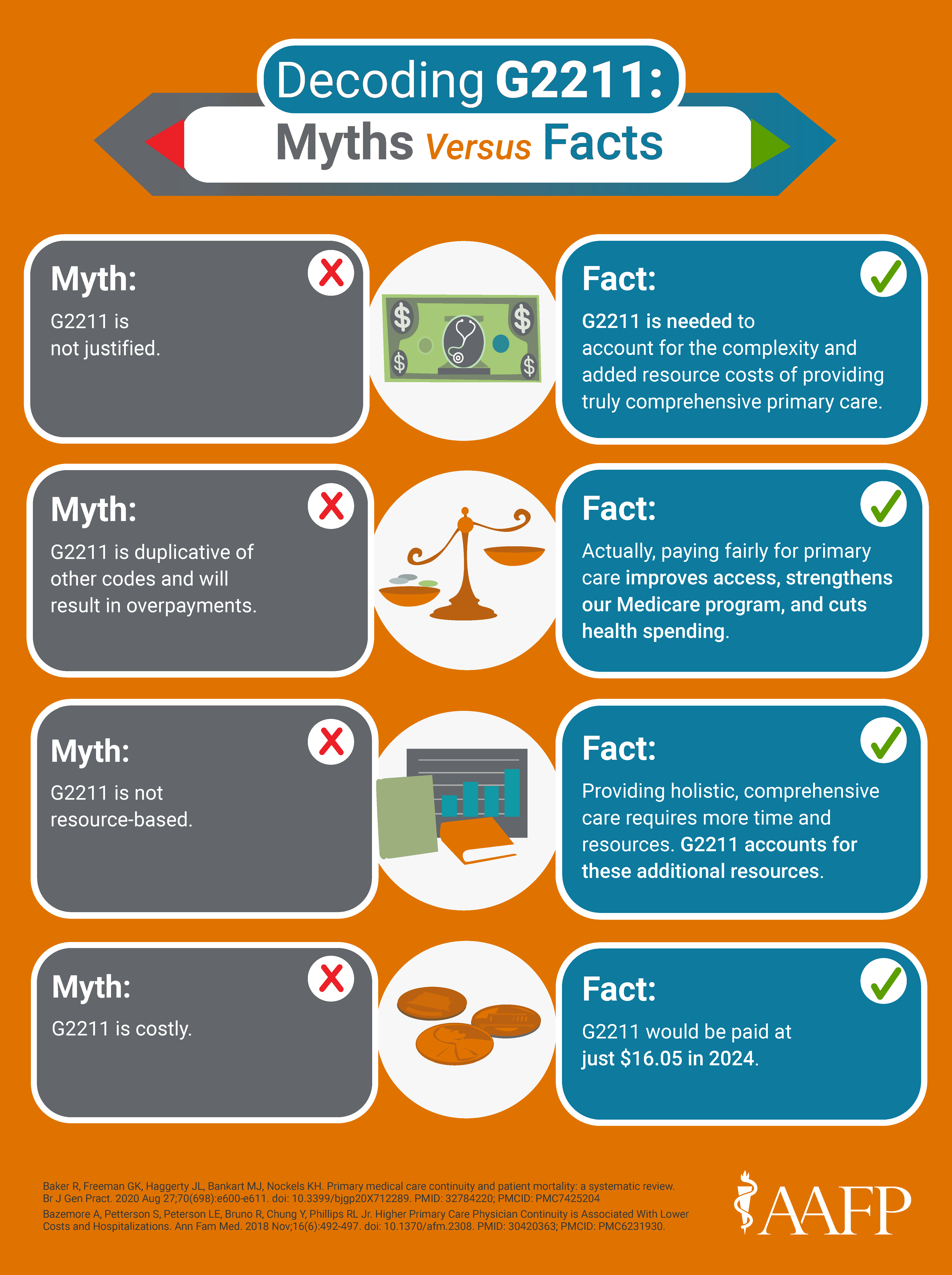G2211 Add-on Code: What It Is and When To Use It
The AAFP is closely monitoring implementation of G2211 and will update this page as CMS releases more information.
The care you provide your patients is complex and comprehensive. G2211 will help you get paid more accurately for it. Starting January 1, 2024, use this new add-on code alongside office/outpatient evaluation and management (E/M) codes to receive additional payment for the high-value visits you provide.
What is G2211?
Healthcare Common Procedure Coding System (HCPCS) add-on code G2211 reflects the time, intensity, and practice expense resources involved when physicians provide office/outpatient visits that build longitudinal relationships with patients and address the majority of a patient’s health care needs with consistency and continuity over longer periods of time.
The Centers for Medicare & Medicaid Services (CMS) created code G2211 to better account for the resource costs associated with visit complexity inherent to primary care and other longitudinal care.
The 2024 national Medicare allowable for G2211 is $16.05.
CMS Code Descriptor: G2211
Visit complexity inherent to evaluation and management associated with medical care services that serve as the continuing focal point for all needed health care services and/or with medical care services that are part of ongoing care related to a patient's single, serious condition or a complex condition. (Add-on code, list separately in addition to office/outpatient evaluation and management visit, new or established)
When to use G2211
HCPCS code G2211 is payable starting January 1, 2024.
G2211 is an add-on code that may be reported with new and established patient office/outpatient evaluation and management (E/M) services.
✔️ Use the add-on code when you are the continuing focal point for all health care services the patient needs. Per CMS, the relationship between the patient and the physician is the determining factor of when the add-on code should be billed.
✔️ As of 2026, G2211 may also be reported with home or residence E/M services (CPT codes 99341-99350).
Do not use G2211 when:
❌ Your relationship with the patient is of a discrete, routine, or time-limited nature. For example, a physician who sees a patient for an acute concern should not report HCPCS G2211 if they have not also assumed responsibility for the patient’s ongoing medical care or do not plan to take responsibility for subsequent, ongoing medical care with consistency and continuity over time.
FPM covers 2026 Medicare Fee Schedule and CPT Coding Update
The 2026 Medicare Physician Fee Schedule includes several provisions that should boost primary care. Read the article.

Get the facts about why G2211 is needed.
How to start billing for G2211
Update your EHR and/or billing systems to reflect the 2024 Medicare physician fee schedule.
- Verify G2211 is added as part of the updates. Usually practice management or billing and coding staff can help with this.
- Since deductible and coinsurance apply, inform patients that there may be an additional charge on their bill.
Report HCPCS code G2211 with office visits where you have assumed or intend to assume responsibility for the patient’s ongoing medical care.
Educate your administration and coding staff about the importance of G2211.
Let them know that:
- Studies show that primary care office visits are more complex than those conducted by other specialties. Primary care physicians pack highly complex care into brief visits by managing all a patient’s acute and chronic conditions, providing ongoing preventive services, and counseling, and addressing behavioral health challenges and unmet social needs. To fully account for this additional complexity and related practice costs, G2211 is needed.
- Medicare officials agree that updated office visit E/M payments do not fully account for the more complex, whole-person care provided by primary care physicians. Existing coding processes are better at denoting procedures than at describing cognitive services such as continuous, comprehensive primary care.
- Current E/M coding fails to account for many of the unique services and resources that primary care physicians provide or reflect their extraordinary role in coordinating care for their patients. The typical primary care physician caring for Medicare patients must coordinate care with 229 other physicians working in 117 practices.
G2211 Update and Infographic | FPM Jan/Feb 2025
Family physician authors developed an article and infographic that make G2211 less confusing to navigate in 2025.
National G2211 Private Payer Coverage Matrix | Updated June 17, 2024
This table is updated as the AAFP receives requested coverage details.
Verifying Coverage and Navigating Denials Guide
Use this guide when you want to contact payers about their G2211 policies or need to address an inappropriate claim denial.
Letter Template: Physician to Payer
Use this letter template to craft a message to private payers about the importance of coverage and payment of G2211.
Letter Template: Physician to Employer
Employed physicians can use this letter template to encourage their organizations to reach out to private payers with support for G2211 coverage.
Template: G2211 Private Payer Coverage Matrix
Keep track of your payers' policies on G2211 with a table to help you keep coverage status, resource links, and contact information organized.
G2211 Advocacy Talking Points
Members and AAFP chapter staff are encouraged to partner and advocate for coverage and payment of G2211. Use these talking points to educate stakeholders on the purpose of the add-on code and the complexity of primary care.
According to the guidance in the Medicare Learning Network Matters: How to Use the Office and Outpatient (O/O) Evaluation and Management Visit Complexity Add-on Code G2211:
“You must document the reason for billing the O/O E/M visit. The visits themselves would need to be medically reasonable and necessary for the practitioner to report G2211. In addition, the documentation would need to illustrate medical necessity of the O/O E/M visit. We [CMS] haven’t required additional documentation. Our [CMS] medical reviewers may use the medical record documentation to confirm the medical necessity of the visit and accuracy of the documentation of the time you spent. These items could serve as supporting documentation for billing code G2211:
- Information included in the medical record or in the claims history for a patient/practitioner combination, such as diagnoses
- The practitioner’s assessment and plan for the visit
- Other service codes billed.”
Private payers (including commercial and Medicare Advantage) and Medicaid are not required to cover and pay separately for G2211, and their policies will vary. The AAFP encourages you to review your contracts and speak with your provider relations representatives about adding G2211 to your fee schedule.
The AAFP is strongly advocating that private payers cover and pay for G2211 across all lines of business. Additional information regarding the AAFP’s advocacy efforts can be found on the Decoding G2211: Myths Versus Facts webpage.
CMS has not explicitly defined "single, serious condition, or complex condition." However, they have provided HIV and sickle cell disease as examples. Their guidance emphasizes the importance of the longitudinal relationship and serving as the continuing focal point for all of the patient's health care needs. The complexity captured by G2211 is not related to the condition itself. Further, CMS notes, "Add-on code G2211 includes services that enable practitioners to build longitudinal relationships with all patients (that is, not only those patients who have a chronic condition or single, high-risk disease) and to address the majority of patients' health care needs with consistency and continuity over long periods of time.”
Since FQHCs and RHCs are paid an encounter rate rather than based on the complexity of the patient, G2211 will be bundled into the FQHC prospective payment system rate and the RHC all-inclusive rate.
Yes, it may be reported under the primary care exception as long as the code’s requirements are satisfied.
No, G2211 is not restricted based on medical specialty. CMS emphasizes that it could be reported by physicians with office visit E/M visits for care that serves as the continuing focal point for all needed health care services (e.g., primary care physicians) and/or with medical care services that are part of ongoing care related to a patient’s single, serious condition or complex condition.
There are no frequency limitations on G2211. It can be billed with any office E/M visit as long as the code’s requirements are met (i.e., the physician serves as the continuing focal point for all needed health care services).
Yes, G2211 is subject to Medicare’s deductible and coinsurance.
Yes, G2211 is on the Medicare List of Telehealth Services (ZIP) and can be billed with office visit E/M services (CPT codes 99202-99215) and home and residence E/M (CPT codes 99341-99350) services provided via telehealth.
Yes, CMS includes two examples of how to use G2211 in the MLN download on page 2.
Beginning in 2025, Medicare will pay for G2211 when the base E/M code is appended with modifier 25 and provided on the same day as an annual wellness visit, vaccine administration, or any Medicare Part B preventive service.
If you want to learn more about modifier 25 so that you are only using it when appropriate, the following resources and tips from FPM and the AMA can help:
- AAFP: How to Use Modifier 25 learning hub
- FPM Getting Paid Blog: Seven quick tips for using modifier 25 (April 2023)
- FPM Article: Combining a Wellness Visit With a Problem-Oriented Visit: a Coding Guide (January/February 2022)
- FPM Article: Getting Paid for Screening and Assessment Services (November/December 2017)
- AMA: Setting the record straight on proper use of modifier 25
- AMA CPT® Assistant: Reporting CPT Modifier 25
CMS has published the following downloads to explain G2211 and its use:
- Medicare G2211 FAQ
- MLN13473 How to Use the Office and Outpatient Evaluation and Management Visit Complexity Add-on Code G2211 (Released January 18, 2024)
- CR13473: Guidance for the Implementation of the Office and Outpatient Evaluation and Management Visit Complexity Add-on Code G2211 (Released January 18, 2024)

Understand how to properly document and code for E/M services.